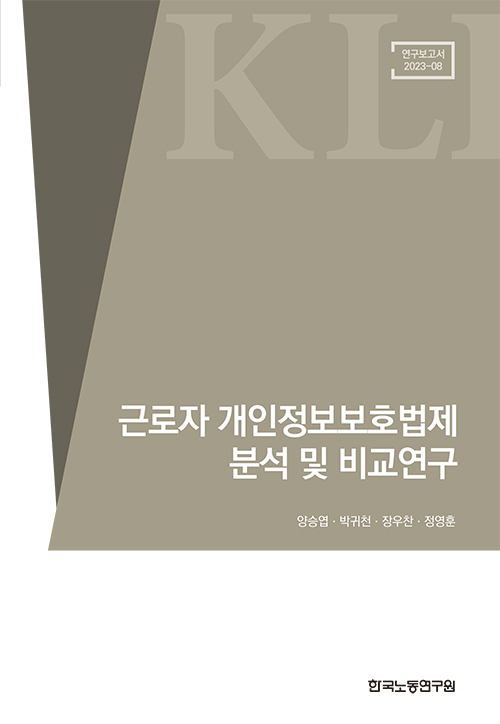한국노동연구원 'Research Series'에 대한 설명 입니다.
Research Series
Research Series

Legislation on the Protection of Workers’ Personal Information: Analysis and Comparative Study
- Author Seung Yub Yang et al.
- Publication Date 2023.12.29
- Length 181
- ISBN 979-11-260-0678-6
Content
Chapter 1 Introduction
Chapter 2 Limitations of Current Legislation on the Protection of Workers’ Personal Information
Chapter 3 Comparison of the Protection of Workers’ Personal Information in Major Countries
Chapter 4 Conclusion and Implications
Summary
The necessity of this study begins with the fact that the development of information and communication technology has dramatically changed the way employers handle workers' personal information. Employers can collect workers' personal information secretly, across time and space, and in large quantities in various fields, and in particular, they can integrate personal information even if it is fragmented. Workers' personal information collected by users soon becomes a new "power" for users. The asymmetry of information makes workers even more dependent on users. Originally, workers are personally subordinated to the employer while providing labor, but this asymmetrical subordination of information puts them in a double disadvantage and forces them to voluntarily submit to the employer by censoring themselves.
In addition, with the expansion of electronic labor surveillance, workers are under pressure of being constantly monitored, but there is no current legislation to properly regulate this problem, so employers and workers should be covered by the general provisions of the Personal Information Protection Act, and in special cases, the Protection of Communications Secrets Act, the Act on the Protection and Use of Location Information, and the Act on Promotion of Information and Communications Network Utilization and Information Protection may be applied.
Since there is a lack of legislation, the purpose of this study is to suggest the direction and content of new legislation to protect workers' personal information and to set the limits of electronic labor surveillance. To this end, a comparative legal study is conducted to identify the problems of the current legislation and to find an appropriate model. (For the full text of the English summary, please download the “Download 2 English_Abstract”.)
 Source Indication + Commercial Use Prohibition + Change Prohibition
Source Indication + Commercial Use Prohibition + Change Prohibition